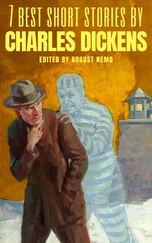Charles Dickens - Pearl-Fishing; Choice Stories from Dickens' Household Words; First Series
Здесь есть возможность читать онлайн «Charles Dickens - Pearl-Fishing; Choice Stories from Dickens' Household Words; First Series» — ознакомительный отрывок электронной книги совершенно бесплатно, а после прочтения отрывка купить полную версию. В некоторых случаях можно слушать аудио, скачать через торрент в формате fb2 и присутствует краткое содержание. ISBN: , Издательство: Иностранный паблик, Жанр: foreign_prose, на английском языке. Описание произведения, (предисловие) а так же отзывы посетителей доступны на портале библиотеки ЛибКат.
- Название:Pearl-Fishing; Choice Stories from Dickens' Household Words; First Series
- Автор:
- Издательство:Иностранный паблик
- Жанр:
- Год:неизвестен
- ISBN:http://www.gutenberg.org/ebooks/49927
- Рейтинг книги:5 / 5. Голосов: 1
-
Избранное:Добавить в избранное
- Отзывы:
-
Ваша оценка:
- 100
- 1
- 2
- 3
- 4
- 5
Pearl-Fishing; Choice Stories from Dickens' Household Words; First Series: краткое содержание, описание и аннотация
Предлагаем к чтению аннотацию, описание, краткое содержание или предисловие (зависит от того, что написал сам автор книги «Pearl-Fishing; Choice Stories from Dickens' Household Words; First Series»). Если вы не нашли необходимую информацию о книге — напишите в комментариях, мы постараемся отыскать её.
Pearl-Fishing; Choice Stories from Dickens' Household Words; First Series — читать онлайн ознакомительный отрывок
Ниже представлен текст книги, разбитый по страницам. Система сохранения места последней прочитанной страницы, позволяет с удобством читать онлайн бесплатно книгу «Pearl-Fishing; Choice Stories from Dickens' Household Words; First Series», без необходимости каждый раз заново искать на чём Вы остановились. Поставьте закладку, и сможете в любой момент перейти на страницу, на которой закончили чтение.
Интервал:
Закладка:
Anielka, overpowered with gratitude, threw herself at the feet of the prince. She dreamed all night of the happiness that was in store for her, and the joy of the poor, forsaken, old people; and when the next morning she set off, she could scarcely restrain her impatience. At last they approached the cabin; she saw the forest, with its tall trees, and the meadows covered with flowers. She leaped from the carriage, that she might be nearer these trees and flowers, every one of which she seemed to recognize. The weather was beautiful. She breathed with avidity the pure air which, in imagination, brought to her the kisses and caresses of her poor father! Her foster-father was, doubtless, occupied with his bees; but his wife?
Anielka opened the door of the cabin; all was silent and deserted. The arm-chair on which the poor old woman used to sit, was overturned in a corner. Anielka was chilled by a fearful presentiment. She went with a slow step towards the bee-hives; there she saw a little boy tending the bees, whilst the old man was stretched on the ground beside him. The rays of the sun, falling on his pale and sickly face, showed that he was very ill. Anielka stooped down over him, and said, “It is I, it is Anielka, your own Anielka, who always loves you.”
The old man raised his head, gazed upon her with a ghastly smile, and took off his cap.
“And my good old mother, where is she?” Anielka asked.
“She is dead!” answered the old man, and falling back he began laughing idiotically. Anielka wept. She gazed earnestly on the worn frame, the pale and wrinkled cheeks, in which scarcely a sign of life could be perceived; it seemed to her that he had suddenly fallen asleep, and not wishing to disturb him, she went to the carriage for the presents. When she returned, she took his hand. It was cold. The poor old bee-keeper had breathed his last!
Anielka was carried almost senseless back to the carriage, which quickly returned with her to the castle. There she revived a little; but the recollection that she was now quite alone in the world, almost drove her to despair.
Her master’s wedding and the journey to Florence were a dream to her. Though the strange sights of a strange city slowly restored her perceptions, they did not her cheerfulness. She felt as if she could no longer endure the misery of her life; she prayed to die.
“Why are you so unhappy?” said the Count Leon kindly to her, one day.
To have explained the cause of her wretchedness would have been death indeed.
“I am going to give you a treat,” continued Leon. “A celebrated singer is to appear to-night in the theatre. I will send you to hear her, and afterwards you shall sing to me what you remember of her performances.”
Anielka went. It was a new era in her existence. Herself, by this time, an artist, she could forget her griefs, and enter with her whole soul into the beauties of the art she now heard practised in perfection for the first time. To music a chord responded in her breast which vibrated powerfully. During the performances she was at one moment pale and trembling, tears rushing into her eyes, at another, she was ready to throw herself at the feet of the cantatrice, in an ecstasy of admiration. “Prima donna,” – by that name the public called on her to receive their applause, and it was the same, thought Anielka, that Justiniani had bestowed upon her. Could she also be a prima donna? What a glorious destiny! To be able to communicate one’s own emotions to masses of entranced listeners; to awaken in them, by the power of the voice, grief, love, terror.
Strange thoughts continued to haunt her on her return home. She was unable to sleep. She formed desperate plans. At last she resolved to throw off the yoke of servitude, and the still more painful slavery of feelings which her pride disdained. Having learnt the address of the prima donna, she went early one morning to her house.
On entering she said, in French, almost incoherently, so great was her agitation – “Madam, I am a poor serf belonging to a Polish family who have lately arrived in Florence. I have escaped from them; protect, shelter me. They say I can sing.”
The Signora Teresina, a warm-hearted, passionate Italian, was interested by her artless earnestness. She said, “Poor child! you must have suffered much,” – she took Anielka’s hand in hers. “You say you can sing; let me hear you.” Anielka seated herself on an ottoman. She clasped her hands over knees, and tears fell into her lap. With plaintive pathos, and perfect truth of intonation, she prayed in song. The Hymn to the Virgin seemed to Teresina to be offered up by inspiration.
The Signora was astonished. “Where,” she asked, in wonder, “were you taught?”
Anielka narrated her history, and when she had finished, the prima donna spoke so kindly to her that she felt as if she had known her for years. Anielka was Teresina’s guest that day and the next. After the opera, on the third day, the prima donna made her sit beside her, and said: —
“I think you are a very good girl, and you shall stay with me always.”
The girl was almost beside herself with joy.
“We will never part. Do you consent, Anielka?”
“Do not call me Anielka. Give me instead some Italian name.”
“Well, then, be Giovanna. The dearest friend I ever had – but whom I have lost – was named Giovanna,” said the prima donna.
“Then, I will be another Giovanna to you.”
Teresina then said, “I hesitated to receive you at first, for your sake as well as mine; but you are safe now. I learn that your master and mistress, after searching vainly for you, have returned to Poland.”
From this time Anielka commenced an entirely new life. She took lessons in singing every day from the Signora, and got an engagement to appear in inferior characters at the theatre. She had now her own income, and her own servant – she, who had till then been obliged to serve herself. She acquired the Italian language rapidly, and soon passed for a native of the country.
So passed three years. New and varied impressions failed, however, to blot out the old ones. Anielka arrived at great perfection in her singing, and even began to surpass the prima donna, who was losing her voice from weakness of the chest. This sad discovery changed the cheerful temper of Teresina. She ceased to sing in public; for she could not endure to excite pity where she had formerly commanded admiration.
She determined to retire. “You,” she said to Anielka, “shall now assert your claim to the first rank in the vocal art. You will maintain it. You surpass me. Often, on hearing you sing, I have scarcely been able to stifle a feeling of jealousy.”
Anielka placed her hand on Teresina’s shoulder, and kissed her.
“Yes,” continued Teresina, regardless of everything but the bright future she was shaping for her friend. “We will go to Vienna – there you will be understood and appreciated. You shall sing at the Italian Opera, and I will be by your side – unknown, no longer sought, worshipped – but will glory in your triumphs. They will be a repetition of my own; for have I not taught you? Will they not be the result of my work?”
Though Anielka’s ambition was fired, her heart was softened, and she wept violently.
Five months had scarcely elapsed when a furore was created in Vienna by the first appearance, at the Italian Opera, of the Signora Giovanna. Her enormous salary at once afforded her the means of even extravagant expenditure. Her haughty treatment of male admirers only attracted new ones; but in the midst of her triumphs, she thought often of the time when the poor orphan of Pobereze was cared for by nobody. This remembrance made her receive the flatteries of the crowd with an ironical smile; their fine speeches fell coldly on her ear, their eloquent looks made no impression on her heart: that , no change could alter, no temptation win.
Читать дальшеИнтервал:
Закладка:
Похожие книги на «Pearl-Fishing; Choice Stories from Dickens' Household Words; First Series»
Представляем Вашему вниманию похожие книги на «Pearl-Fishing; Choice Stories from Dickens' Household Words; First Series» списком для выбора. Мы отобрали схожую по названию и смыслу литературу в надежде предоставить читателям больше вариантов отыскать новые, интересные, ещё непрочитанные произведения.
Обсуждение, отзывы о книге «Pearl-Fishing; Choice Stories from Dickens' Household Words; First Series» и просто собственные мнения читателей. Оставьте ваши комментарии, напишите, что Вы думаете о произведении, его смысле или главных героях. Укажите что конкретно понравилось, а что нет, и почему Вы так считаете.












